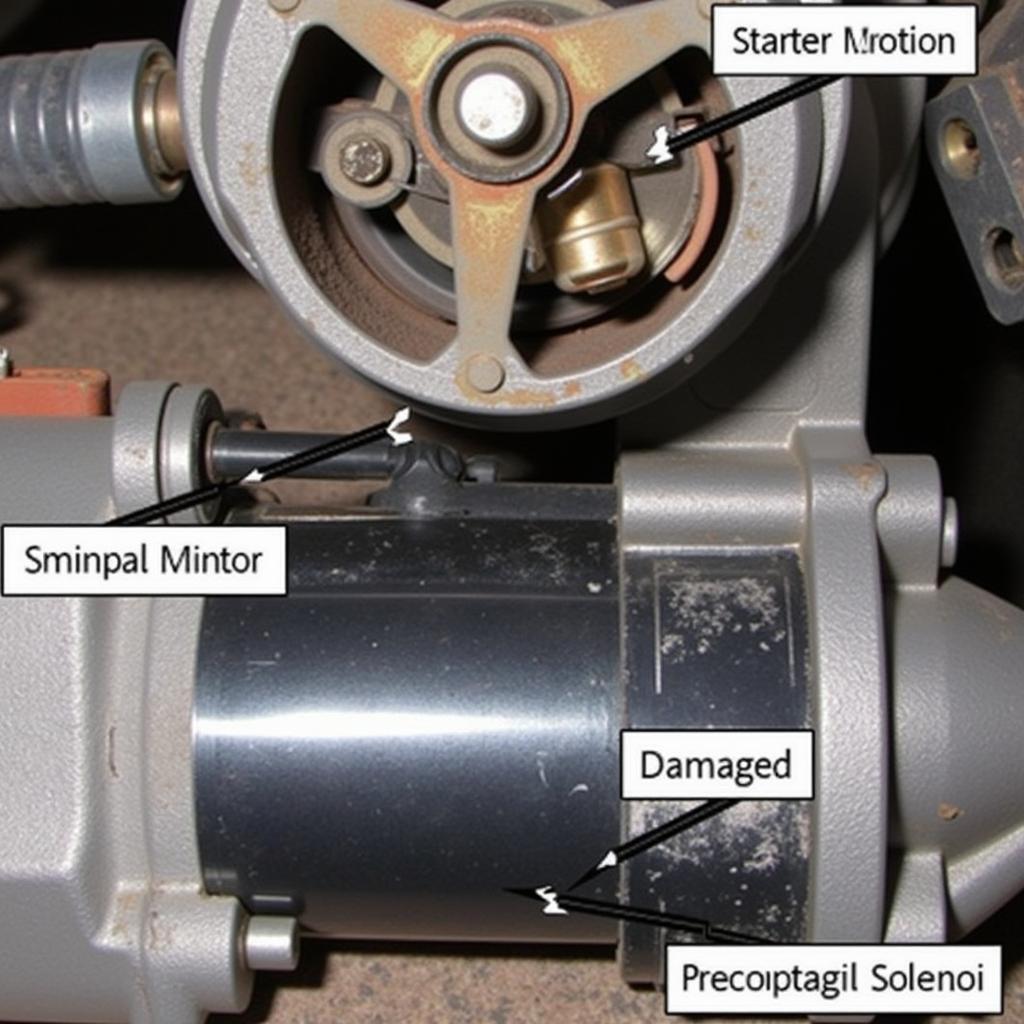A dead car battery is often the culprit when your vehicle refuses to start. But what if your car won’t start battery charged? This scenario can be perplexing, but with the right diagnostic approach, you can pinpoint the issue and get back on the road. This guide provides a comprehensive troubleshooting process for when your car won’t start even with a fully charged battery.
One common issue could be a faulty starter. Check out our article on dead battery starter for more information. While a charged battery provides the electrical power, the starter is the component responsible for cranking the engine. If the starter malfunctions, the engine won’t turn over even with a fully charged battery. This can manifest as a clicking sound when you turn the key, or complete silence.
Identifying the Problem: Beyond the Battery
When your car won’t start battery charged, the problem often lies elsewhere in the starting system. Here’s a breakdown of potential culprits:
Faulty Starter Motor
As mentioned earlier, the starter motor is a critical component. It’s an electric motor that engages with the engine’s flywheel to initiate the combustion process. A bad starter can prevent the engine from turning over even with a good battery. Symptoms include clicking noises, grinding sounds, or complete silence when turning the key.
 Signs of a Bad Starter Motor
Signs of a Bad Starter Motor
Ignition System Problems
The ignition system is responsible for delivering the spark that ignites the fuel-air mixture. A malfunctioning ignition switch, a faulty ignition coil, or worn-out spark plugs can prevent the engine from starting. Symptoms might include the engine cranking but not starting, or a rough idle once the engine does start.
Fuel System Issues
If your car won’t start battery charged, the fuel system could be another area to investigate. A clogged fuel filter, a malfunctioning fuel pump, or a faulty fuel injector can starve the engine of fuel, preventing it from starting.
Other Potential Problems
Other issues, such as a bad alternator, corroded battery terminals, or even a faulty security system, can also prevent a car from starting, even with a good battery. These should be considered after ruling out the more common causes. Sometimes, a car battery drain problem can be the underlying cause, as seen in some Camaro models.
Diagnosing the Issue: A Step-by-Step Guide
- Check the Battery Connections: Ensure the battery terminals are clean and securely connected. Corrosion can disrupt the flow of electricity.
- Test the Starter: Try tapping on the starter motor with a hammer while someone attempts to start the car. If the car starts intermittently, the starter is likely faulty.
- Inspect the Ignition System: Check for damage to the ignition switch, ignition coil, and spark plugs.
- Examine the Fuel System: Listen for the fuel pump engaging when you turn the key. Check the fuel filter for clogs.
- Consider Other Possibilities: Inspect the alternator, battery cables, and security system.
“A fully charged battery doesn’t guarantee a starting car. Always systematically check the starting, ignition, and fuel systems,” advises John Miller, Senior Automotive Technician at Miller’s Auto Repair.
Remote Diagnostics and Software Solutions
In today’s technologically advanced world, remote diagnostics and software installations can be used to address some starting issues. Certain software glitches can prevent a car from starting. A remote diagnostic session can identify these issues and provide software updates or reprogramming as needed. “Remote software solutions are increasingly helpful in resolving complex car starting problems,” adds Jane Doe, Automotive Software Engineer at AutoSoft Solutions.
If you’ve charged your car battery and now it won’t start, consider exploring remote diagnostic options. Similarly, if you have a good battery and your car won’t start, remote diagnostics can pinpoint the issue. For information on batteries, you might find our article on whether a new car battery will die if not used helpful.
Conclusion
A car that won’t start battery charged can be frustrating, but a systematic diagnostic approach can help identify the underlying problem. By examining the starter, ignition system, and fuel system, you can often pinpoint the culprit. Don’t forget that remote diagnostic services and software solutions are available to help resolve these complex issues and get you back on the road quickly. If you’re struggling to find the solution, seeking professional help is always a good option.
FAQ
-
Can a car with a fully charged battery still not start? Yes, several other components besides the battery can prevent a car from starting.
-
What are the most common reasons a car won’t start with a charged battery? A faulty starter, ignition problems, and fuel system issues are the most common culprits.
-
How can I test my car’s starter motor? You can try tapping on the starter while someone tries to start the car. Intermittent starting often indicates a faulty starter.
-
What should I do if I suspect an ignition system problem? Check the ignition switch, ignition coil, and spark plugs for damage or wear.
-
How can I tell if my fuel system is causing the starting problem? Listen for the fuel pump engaging and check the fuel filter for clogs.
-
Are there any software-related issues that can prevent a car from starting? Yes, certain software glitches can prevent a car from starting and can be addressed with remote diagnostics and software updates.
-
What if I’ve tried everything and my car still won’t start? Seek professional help from a qualified mechanic or an automotive technician. They have the expertise and tools to diagnose and resolve complex starting problems.

